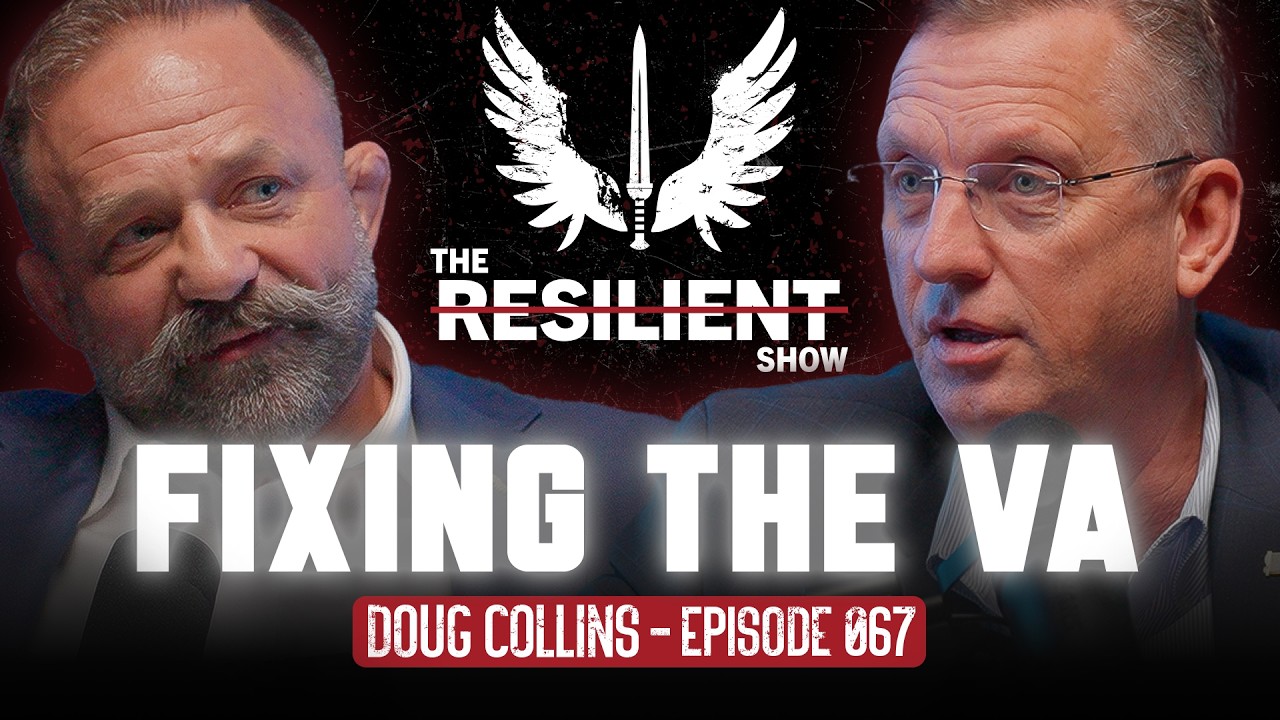Politics
Trump’s VA Secretary Touts How He ‘Opened That Door’ To Psychedelic Therapy For Veterans

The head of the U.S. Department of Veterans Affairs (VA) is touting his role in promoting psychedelics access for military veterans with serious mental health conditions, saying he “opened that door probably wider than most ever thought” was possible.
During an interview on The Resilient Show podcast that was released last week, VA Secretary Doug Collins described his interest in psychedelic therapy and cross-departmental work to advance clinical trials into substances such as ibogaine and MDMA.
He acknowledged that there are rules in place that make it challenging to provide widespread access without Food and Drug Administration (FDA) approval, but said “there are areas that we can boost clinical trials.”
“I’m the first VA secretary—actually, in a Cabinet meeting about a month and a half ago—to actually bring up psychedelics in a Cabinet meeting,” Collins said. “I think what we got to look at is we’ve got to put alternatives on the map. The VA is going to do our job. We’re going to do within the law and do what we have to do.”
“Look, I’ve never partaken in any of it. Nothing. You know, marijuana—it’s just never been… But what I am seeing, and we see in clinical trials, is that some of this is working,” he said. “I don’t know how it’s working. I don’t know why it necessarily works, but I see that getting a treatment—having counseling many times attached to it—we’re watching these numbers go down in people, and they’re able to live normal lives. They’re able to not be in the situations that they’re in.”
“For me, my question is: Why would I not look at something like that?,” the secretary said. “I believe in taking a step further.”
While VA may be a ways out from allowing people to access psychedelics via prescription from an agency doctor, he said they’re working with FDA and the U.S. Department of Health and Human Services (HHS) “on how we can make some of these clinical trials more available.”
“I want it in the controlled environment,” Collins said, while adding a word of caution.
“One of the bigger concerns I have…is sometimes things come out and they’re perceived as the savior to everything, and they go to places that may or may not be good,” he said. “I also want to be just honest. Don’t run off to everything that’s shiny. Some of it works and some of it doesn’t.”
“What I’m trying to do is, I want our veterans to come to a place where we’ve looked at it through other organizations, through other medical organizations and FDA, finding treatments that work, making them safe and understanding the consequences, and then getting them to the people as quickly as we possibly can,” he said. “I’ve opened that door. I’ve opened that door probably wider than most we ever thought. We’re going to do it the right way.”
Collins said “we’re having some good” results with respect to clinical trials investigating ibogaine, MDMA and psilocybin, while emphasizing that VA is “not recreationalizing these drugs at all.”
“They’re very controlled. They give the dosage. They know that they’re in a safe environment. They are relaxed. They’re being watched for anything that may or may not happen,” he said. “And what they’re finding is allowing the veteran to talk about things or deal with things that normal discussions like you and I are having are not able to.”
“I want to get it to where, if this helps, then I want to get them to be able to be off all the drugs. Let’s get them off where they can manage,” Collins continued. “But if they need drugs, that’s fine. That’s okay. But we need to make sure that it’s not sort of our reflexive outcome that we have to have.”
“It can’t be reflexive, right? That’s become my concern a little bit, and I want to make sure we’re not reflexively saying, ‘Well, I’ve got, you know, 30 people on a caseload here, here’s your X drug. Just take this and it’ll calm you down, and you’ll be fine. Okay, that would really be like, in many ways for us, just believing that somebody presents with a fever, I give them Tylenol or Advil, the fever comes down and I solve it. No, you just mask the fever.”
Later in the interview, the secretary talked about the cross-functionality of the current administration, pointing out that HHS Secretary Robert F. Kennedy Jr. personally reached out to him “to start talking about psychedelics.”
“He came to me and we went to both offices. We shared people—the labor. It’s just a different function,” Collins said.
Last week, the secretary also reiterated that he’s “very open” to expanding access to psychedelics therapy for veterans—emphasizing that he’s intent on finding ways to “cure” people with serious mental health conditions and not just treat their surface-level symptoms.
Collins noted that VA either internally or through private partnerships is actively conducting about a dozen clinical trials into “various different substances that we’re seeing actually really good results on,” including one based at VA Bronx Health Care that’s investigating MDMA-assisted therapy with “actually really, really good results.”
During that interview, Collins was also shown a recent clip of Navy SEAL veteran Rob O’Neill, who killed Osama Bin Laden, talking about his theory that the federal government has intentionally avoided providing access to psychedelic medicine because cures are less profitable than long-term treatments. Collins responded by saying, “I’m going to tell you right now: This secretary of veterans affairs, myself, I want to heal people.”
Meanwhile, earlier this month a GOP-controlled House committee approved an amendment attached to a must-pass defense bill that would require a “progress report” on an ongoing psychedelic therapy pilot program for active duty military service members and veterans.
However, while Congress has been notably amenable to psychedelics research proposals in recent sessions, the House Rules Committee last week separately blocked a bipartisan amendment to a spending bill led by Rep. Morgan Luttrell (R-TX) that would have given DOD another $10 million to support clinical trials into the therapeutic potential of substances such as ibogaine and psilocybin.
Separately, bipartisan congressional lawmakers recently met with the VA secretary to discuss pathways to provide access to psychedelic medicine as an alternative treatment option for conditions such as PTSD.
After requesting the meeting with Collins in May, Reps. Lou Correa (D-CA) and Jack Bergman (R-MI)—founding co-chairs of the Congressional Psychedelic Advancing Therapies (PATH) Caucus—said the three had a productive conversations about advancing psychedelics therapy for the veteran community.
Collins has stood out as a VA secretary who’s especially passionate about exploring the potential of substances such as ibogaine and MDMA to provide relief from serious mental health conditions, coordinating with other officials including Kennedy, the head of HHS, who said recently that his aim is to free up plant-based medicine options within 12 months.
Former U.S. House Speaker Newt Gingrich (R-GA) separately said the psychedelic ibogaine represents an “astonishing breakthrough” in the nation’s current “sick care system” that’s left people with serious mental health conditions without access to promising alternative treatment options—and he intends to use his influence to advance the issue.
Separately, the U.S. House of Representatives recently included an amendment to a spending bill from Correa and Bergman that would encourage VA to support research into the benefits of psychedelics in treating medical conditions commonly affecting military veterans.
Collins, for his part, also disclosed in April that he had an “eye-opening” talk with Kennedy about the therapeutic potential of psychedelic medicine. And he said he’s open to the idea of having the government provide vouchers to cover the costs of psychedelic therapy for veterans who receive services outside of VA as Congress considers pathways for access.
The secretary’s visit to the psychedelics research center came about a month after the VA secretary met with a military veteran who’s become an advocate for psilocybin access to discuss the therapeutic potential of psychedelic medicine for the veteran community.
Correa and Bergman separately introduced a bill in April to provide $30 million in funding annually to establish psychedelics-focused “centers for excellence” at VA facilities, where veterans could receive novel treatment involving substances like psilocybin, MDMA and ibogaine.
—
Marijuana Moment is tracking hundreds of cannabis, psychedelics and drug policy bills in state legislatures and Congress this year. Patreon supporters pledging at least $25/month get access to our interactive maps, charts and hearing calendar so they don’t miss any developments.
![]()
Learn more about our marijuana bill tracker and become a supporter on Patreon to get access.
—
Bergman has also expressed optimism about the prospects of advancing psychedelics reform under Trump, arguing that the administration’s efforts to cut spending and the federal workforce will give agencies “spines” to tackle such complex issues.
Kennedy, for his part, also said in April that he had a “wonderful experience” with LSD at 15 years old, which he took because he thought he’d be able to see dinosaurs, as portrayed in a comic book he was a fan of.
Last October, Kennedy specifically criticized FDA under the prior administration over the agency’s “suppression of psychedelics” and a laundry list of other issues that he said amounted to a “war on public health” that would end under the Trump administration.
In December, VA separately announced that it’s providing $1.5 million in funding to study the efficacy of MDMA-assisted therapy for veterans with PTSD and alcohol use disorder (AUD).
Last year, VA’s Yehuda also touted an initial study the agency funded that produced “stunning and robust results” from its first-ever clinical trial into MDMA therapy.
In January, former VA Under Secretary for Health Shereef Elnahal said that it was “very encouraging” that Trump’s pick to have Kennedy lead HHS has supported psychedelics reform. And he hoped to work with him on the issue if he stayed on for the next administration, but that didn’t pan out.
Photo elements courtesy of carlosemmaskype and Apollo.




